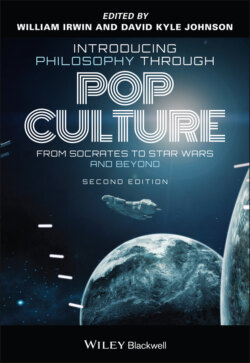Читать книгу Introducing Philosophy Through Pop Culture - Группа авторов - Страница 49
The Skeptical Dilemma: Cartesian Dreams and Demons
ОглавлениеWake up, Neo.
– Computer screen†
The seventeenth‐century French philosopher, scientist, and mathematician René Descartes is famous for taking such skeptical worries seriously, so perhaps he can shed some light on Neo's situation. Descartes took on the project of trying to determine which of his beliefs could be maintained with absolute certainty. He employed what is famously known as his method of doubt. He began by discarding all of his beliefs and resolving to allow them back in, only if it could be shown that they were absolutely certain. Rather than try to prove that any of his beliefs were actually false, which can be quite difficult to do (imagine the work involved in trying to prove that sentient machines aren't secretly plotting a war against us at this very moment), he simply checked his beliefs to see if they admitted any room for doubt. If a belief could be doubted, Descartes withheld his assent from it. It may seem a bit crazy to throw out all of your beliefs at once, but Descartes was not suggesting that a person should live their entire life this way. Rather, he thought that since he had come to accept so many beliefs, most of which were adopted uncritically during his childhood, it would be smart to sift through them at least once in his life, in order to discover which of his beliefs were “rock solid.”
Employing this method, Descartes reached some startling conclusions, which, hundreds of years later, provide the basic framework of the Matrix films. One of Descartes's first big conclusions was that there was absolutely no way to be sure that he wasn't dreaming at any given moment. In his Meditations on First Philosophy he wrote:
How often, at night, I've been convinced that I was here, sitting before the fire, wearing my dressing gown, when in fact I was undressed and between the covers of my bed! … I see so plainly that there are no reliable signs by which I can distinguish sleeping from waking that I am stupefied – and my stupor itself suggests that I am asleep!2
Is it possible that you might be dreaming right now? Some people do not buy it. They argue that there is a difference in “feel” between dreams and waking life.3 Surely, they say, my experience at this moment is too crisp and vivid to be a dream. But while most of us have had fairly lucid dreams in which we realized that we were dreaming, you have probably also had the experience of being totally caught up in a dream, such that you had no idea that the events were not real. Can you be absolutely sure that this is not one of those times? There appears to be at least a slight possibility that this could be a dream.
Some people say they can prove that they are not dreaming. They attempt this by setting certain limits on dreams, for example, that they cannot be in‐color, or that it is impossible to read in a dream. But most people do recall colors from their dreams. And I distinctly remember a dream in which I read – though I must admit that it took quite a bit of effort. Maybe you also recall reading in a dream. But whether you have or not is really beside the point, for there is simply no reason to believe that it is physically (or mentally) impossible to do so.
